Korea
-
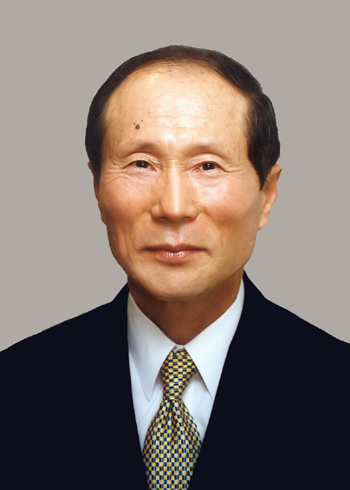 Respected Entrepreneur Chung Elected New Board Chairman of KAIST
Moon-Soul Chung, founder and former CEO of Mirae Corp. who is well known as the first-generation venture entrepreneur in Korea, was elected new chairman of the KAIST Board of Directors at the 193rd Regular Board Meeting held on March 20 in Seoul, school authorities announced Monday, March 23.
Born in 1938 in Imsil, North Jeolla Province, Chung graduated from the Oriental Philosophy Department of Won Kwang University. Chung founded Mirae Corp., a semiconductor equipment manufacturer, in 1983 and got his company listed on KOSDAQ and NASDAQ markets later. His business principles stressing transparency, integrity, and technology, earned the respect of Korean businesspeople.
In 2000, he suddenly announced retirement and handed over the presidency of his company to one of his managing directors. One year later, he donated 30 billion won to KAIST. It was by then the largest amount given by a single donor.
In 2007, he was awarded an honorary degree of doctor of engineering from KAIST. He formerly served as chairman of Venture Leaders Club, President CEO of Lycos Korea and chairman of the board of directors of Kookmin Bank.
2009.03.26 View 14209
Respected Entrepreneur Chung Elected New Board Chairman of KAIST
Moon-Soul Chung, founder and former CEO of Mirae Corp. who is well known as the first-generation venture entrepreneur in Korea, was elected new chairman of the KAIST Board of Directors at the 193rd Regular Board Meeting held on March 20 in Seoul, school authorities announced Monday, March 23.
Born in 1938 in Imsil, North Jeolla Province, Chung graduated from the Oriental Philosophy Department of Won Kwang University. Chung founded Mirae Corp., a semiconductor equipment manufacturer, in 1983 and got his company listed on KOSDAQ and NASDAQ markets later. His business principles stressing transparency, integrity, and technology, earned the respect of Korean businesspeople.
In 2000, he suddenly announced retirement and handed over the presidency of his company to one of his managing directors. One year later, he donated 30 billion won to KAIST. It was by then the largest amount given by a single donor.
In 2007, he was awarded an honorary degree of doctor of engineering from KAIST. He formerly served as chairman of Venture Leaders Club, President CEO of Lycos Korea and chairman of the board of directors of Kookmin Bank.
2009.03.26 View 14209 -
 Workshop on Biomedical IC to Be Held on March 26
KAIST will hold a workshop on "biomedical IC for future healthcare system" on March 26 at a lecture room of the School of Electrical Engineering & Computer Science. The workshop is organized by SEECS and the Korean Institute of Next Generation Computing.
At the workshop, a variety of new technologies expected to expedite the development of biomedical systems will be presented. KAIST Prof. Hoi-Jun Yoo will speak on the "body channel communication" using the human body as the signal transmission medium and Dr. Seung-Hwan Kim of Electronics and Telecommunications Research Institute (ETRI) on a wearable vital sign monitoring system.
Other subjects are CMOS (complementary metal-oxide semiconductor) fully electronic biosensor for biomolecular detection to be presented by KAIST Prof. Gyu-Hyeong Cho; nerve interface and IC (integrated circuit) system design by KAIST Prof. Yoon-gi Nam; design of neural recording and stimulation IC using time-varying magnetic field by KAIST Prof. Seong-Hwan Cho; low power multi-core digital signal processor for hearing aid by Dong-Wook Kim, senior researcher at the Samsung Advanced Institute of Technology; and a non-contact cardiac sensor by KAIST Prof. Seung-Chul Hong.
With the advent of the ageing society, medical expenses of the elderly people are rapidly increasing. As a way to address the issue, interests are growing in "ubiquitous healthcare," a technology that uses a large number of environmental and patient sensors and actuators to monitor and improve patients’ physical and mental condition.
The upcoming workshop is the first academic event on biomedical integrated chips to be held in Korea. The workshop will provide a valuable opportunity for experts in biomedical area to get together and examine the present status of Korean biomedical area and discuss about its future, KAIST officials said.
2009.03.20 View 19799
Workshop on Biomedical IC to Be Held on March 26
KAIST will hold a workshop on "biomedical IC for future healthcare system" on March 26 at a lecture room of the School of Electrical Engineering & Computer Science. The workshop is organized by SEECS and the Korean Institute of Next Generation Computing.
At the workshop, a variety of new technologies expected to expedite the development of biomedical systems will be presented. KAIST Prof. Hoi-Jun Yoo will speak on the "body channel communication" using the human body as the signal transmission medium and Dr. Seung-Hwan Kim of Electronics and Telecommunications Research Institute (ETRI) on a wearable vital sign monitoring system.
Other subjects are CMOS (complementary metal-oxide semiconductor) fully electronic biosensor for biomolecular detection to be presented by KAIST Prof. Gyu-Hyeong Cho; nerve interface and IC (integrated circuit) system design by KAIST Prof. Yoon-gi Nam; design of neural recording and stimulation IC using time-varying magnetic field by KAIST Prof. Seong-Hwan Cho; low power multi-core digital signal processor for hearing aid by Dong-Wook Kim, senior researcher at the Samsung Advanced Institute of Technology; and a non-contact cardiac sensor by KAIST Prof. Seung-Chul Hong.
With the advent of the ageing society, medical expenses of the elderly people are rapidly increasing. As a way to address the issue, interests are growing in "ubiquitous healthcare," a technology that uses a large number of environmental and patient sensors and actuators to monitor and improve patients’ physical and mental condition.
The upcoming workshop is the first academic event on biomedical integrated chips to be held in Korea. The workshop will provide a valuable opportunity for experts in biomedical area to get together and examine the present status of Korean biomedical area and discuss about its future, KAIST officials said.
2009.03.20 View 19799 -
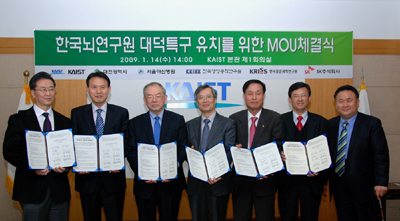 Six Organizations Join Forces to Induce Projected National Brain Institute to Daejeon
Six major organizations including KAIST have joined forces to help Daejeon City to win the government approval to build the envisioned Korean Brain Institute in Daedeok Research Complex.
The six organizations signed a memorandum of understanding on cooperating in establishing the government-funded institute built within the Daedeok Research Complex in the city of Daejeon, at KAIST on Jan. 14. The six organizations are KAIST, the Daejeon City Government, Korea Research Institute of Bioscience and Biotechnology, Korea Research Institute of Standard and Science, Asan Medical Center, and SK Corp., a pioneer in effective therapeutic invention for serious brain disorders.
The partnership of the six organizations is expected to bring a broad-based cooperation opportunities and create a massive synergy effect in the brain science researches and the development of new therapeutic treatment for brain disorders by combining their resources and infrastructures.
The six organizations have also built an international research network with such globally-renowned brain research institutions as RIKEN, a large natural sciences research institute in Japan, Max Plank Institute in Germany, Federal Institute of Technology, Lausanne, in Switzerland and Brain Research Institute of University of Queensland in Australia. The research network is under the support and guidance of Dennis Choi, a prominent neuroscientist who once served as the President of the Society for Neuroscience and is currently a professor in the Departments of Neurology and biology at Emory University.
The tentatively titled Korea Brain Institute is envisioned to help fight brain disorders and create Korea"s new growth engine, as well as lengthening life span, by conducting convergence researches in nero science, brain science and pharmacology. If the consortium of the six organizations wins the government approval to build the proposed institute within the Daedeok complex, the central government and the Daejeon city government are expected to pour a total of 329.7 billion won into the project by 2020.
2009.01.14 View 19074
Six Organizations Join Forces to Induce Projected National Brain Institute to Daejeon
Six major organizations including KAIST have joined forces to help Daejeon City to win the government approval to build the envisioned Korean Brain Institute in Daedeok Research Complex.
The six organizations signed a memorandum of understanding on cooperating in establishing the government-funded institute built within the Daedeok Research Complex in the city of Daejeon, at KAIST on Jan. 14. The six organizations are KAIST, the Daejeon City Government, Korea Research Institute of Bioscience and Biotechnology, Korea Research Institute of Standard and Science, Asan Medical Center, and SK Corp., a pioneer in effective therapeutic invention for serious brain disorders.
The partnership of the six organizations is expected to bring a broad-based cooperation opportunities and create a massive synergy effect in the brain science researches and the development of new therapeutic treatment for brain disorders by combining their resources and infrastructures.
The six organizations have also built an international research network with such globally-renowned brain research institutions as RIKEN, a large natural sciences research institute in Japan, Max Plank Institute in Germany, Federal Institute of Technology, Lausanne, in Switzerland and Brain Research Institute of University of Queensland in Australia. The research network is under the support and guidance of Dennis Choi, a prominent neuroscientist who once served as the President of the Society for Neuroscience and is currently a professor in the Departments of Neurology and biology at Emory University.
The tentatively titled Korea Brain Institute is envisioned to help fight brain disorders and create Korea"s new growth engine, as well as lengthening life span, by conducting convergence researches in nero science, brain science and pharmacology. If the consortium of the six organizations wins the government approval to build the proposed institute within the Daedeok complex, the central government and the Daejeon city government are expected to pour a total of 329.7 billion won into the project by 2020.
2009.01.14 View 19074 -
 Prof. Seong Publishes English Book on Reliability in Digital Control Systems
Prof. Poong-Hyun Seong of Department of Nuclear and Quantum Engineering has recently published an English-language book on reliability and risk issues in large scale safety-critical digital control systems used in complex facilities such as nuclear power plants.
The book entitled “Reliability and Risk Issues in Large Scale Safety-critical Digital Control Systems” is a result of Prof. Seong’s collaboration with some KAIST graduates who used to be under his guidance. The 303-page publication has been published by Springer, one of the world’s leading publishers of academic journals, as part of the Springer Series in Reliability Engineering.
The book consists of four parts; part I deals with issues related to hardware, part II software, part III human factors and finally the last part integrated systems. It can be purchased through some on-line book stores such as Amazon.com.
Prof. Seong served as an editor-in-chief for Nuclear Engineering and Technology (NET), an international journal of Korean Nuclear Society (KNS), from 2003 to 2008. He also worked as a chair of the Human Factors Division (HFD) of American Nuclear Society (ANS) from 2006 to 2007. Prof. Seong is now a commissioner of Korea Nuclear Safety Commission which is the nation’s highest committee on Nuclear Safety.
2008.12.26 View 18089
Prof. Seong Publishes English Book on Reliability in Digital Control Systems
Prof. Poong-Hyun Seong of Department of Nuclear and Quantum Engineering has recently published an English-language book on reliability and risk issues in large scale safety-critical digital control systems used in complex facilities such as nuclear power plants.
The book entitled “Reliability and Risk Issues in Large Scale Safety-critical Digital Control Systems” is a result of Prof. Seong’s collaboration with some KAIST graduates who used to be under his guidance. The 303-page publication has been published by Springer, one of the world’s leading publishers of academic journals, as part of the Springer Series in Reliability Engineering.
The book consists of four parts; part I deals with issues related to hardware, part II software, part III human factors and finally the last part integrated systems. It can be purchased through some on-line book stores such as Amazon.com.
Prof. Seong served as an editor-in-chief for Nuclear Engineering and Technology (NET), an international journal of Korean Nuclear Society (KNS), from 2003 to 2008. He also worked as a chair of the Human Factors Division (HFD) of American Nuclear Society (ANS) from 2006 to 2007. Prof. Seong is now a commissioner of Korea Nuclear Safety Commission which is the nation’s highest committee on Nuclear Safety.
2008.12.26 View 18089 -
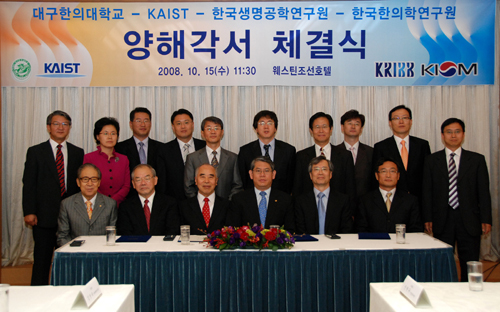 KAIST, KRIBB Agree to Cooperate in Research of Convergence Technologies
Oct. 15, 2008 -- KAIST and Korea Research Institute of Bioscience and Biotechnology (KRIBB) have agreed to cooperate in the research of convergence fields of biotechnology, information technology and nanotechnology.
To this end, the two institutions concluded a memorandum of understanding to create a new academia-institute cooperative model in the convergence fields on Oct. 15 in Seoul, with KAIST President Nam-Pyo Suh, KRIBB Director Young-Hoon Park and Vice Minister of Education, Science and Technology Jong-Koo Park in attendance.
Under the agreement, the two institutions will set up the tentatively-named KAIST-KRIBB BINT Convergence Institute for the development of technologies and nurturing skilled manpower in the convergence fields.
The partnership of the two institutions is expected to bring broad-based cooperation opportunities and create a massive synergy effect by combining their resources and infrastructure for the development of convergence technologies, KAIST officials said..
The proposed institute is also designed to build a world-class research hub in systems biotechnology by combining strengths of the two institutions with initiatives to achieve the Korean government"s new vision for "low carbon, green growth."
The institute will also serve as a base for domestic brain convergence by concentrating the nation"s research capacities in genetics and brain technology.
KAIST also signed a memorandum of understanding for cooperation in researches in Oriental medicine with three institutions, KRIBB, Daegu Hanny University and Korea Institute of Oriental Medicine.
The agreement calls for the four institutions to conduct joint researches in traditional sciences and Oriental medicine based on systems biology, develop manpower in related fields and share academic and research information.
The agreement is expected to provide impetus to reinforcing competitiveness in compound and convergence technologies and discover new properties in Oriental medicine, according to KAIST authorities.
2008.10.16 View 17608
KAIST, KRIBB Agree to Cooperate in Research of Convergence Technologies
Oct. 15, 2008 -- KAIST and Korea Research Institute of Bioscience and Biotechnology (KRIBB) have agreed to cooperate in the research of convergence fields of biotechnology, information technology and nanotechnology.
To this end, the two institutions concluded a memorandum of understanding to create a new academia-institute cooperative model in the convergence fields on Oct. 15 in Seoul, with KAIST President Nam-Pyo Suh, KRIBB Director Young-Hoon Park and Vice Minister of Education, Science and Technology Jong-Koo Park in attendance.
Under the agreement, the two institutions will set up the tentatively-named KAIST-KRIBB BINT Convergence Institute for the development of technologies and nurturing skilled manpower in the convergence fields.
The partnership of the two institutions is expected to bring broad-based cooperation opportunities and create a massive synergy effect by combining their resources and infrastructure for the development of convergence technologies, KAIST officials said..
The proposed institute is also designed to build a world-class research hub in systems biotechnology by combining strengths of the two institutions with initiatives to achieve the Korean government"s new vision for "low carbon, green growth."
The institute will also serve as a base for domestic brain convergence by concentrating the nation"s research capacities in genetics and brain technology.
KAIST also signed a memorandum of understanding for cooperation in researches in Oriental medicine with three institutions, KRIBB, Daegu Hanny University and Korea Institute of Oriental Medicine.
The agreement calls for the four institutions to conduct joint researches in traditional sciences and Oriental medicine based on systems biology, develop manpower in related fields and share academic and research information.
The agreement is expected to provide impetus to reinforcing competitiveness in compound and convergence technologies and discover new properties in Oriental medicine, according to KAIST authorities.
2008.10.16 View 17608 -
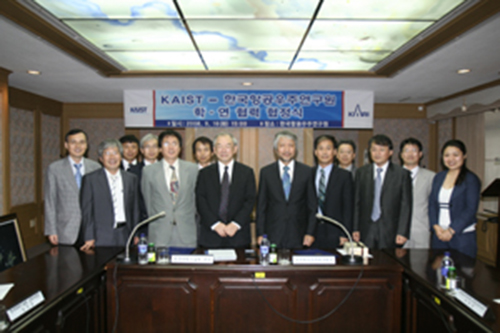 KAIST, KARI to Conduct Joint Research, Exchange Tech Manpower
KAIST and the Korea Aerospace Research Institute (KARI) have agreed to conduct joint researches and exchange technical personnel in order to spur research activities on artificial satellite and other aerospace technology, KAIST announced Wednesday, Sept. 17.
An MOU was signed in a ceremony at the KARI Tuesday, attended by senior officials of the two institutions which both are located in the Daedeok Technopolis in Daejeon City.
Researchers from KARI will participate in KAIST"s interdisciplinary project of "Space Exploratory Engineering" and the two organizations will also jointly take part in the International Lunar Network (ILN), an international moon exploration program, to accelerate development of space technology in Korea.
As a result of the tieup, Dr. Lee So-yeon, Korea"s first astronaut who lived in space for a week aboard a Russian spacecraft this year, will be able to teach and conduct research at KAIST as an adjunct professor. Lee earned her doctorate from KAIST.
2008.09.17 View 16152
KAIST, KARI to Conduct Joint Research, Exchange Tech Manpower
KAIST and the Korea Aerospace Research Institute (KARI) have agreed to conduct joint researches and exchange technical personnel in order to spur research activities on artificial satellite and other aerospace technology, KAIST announced Wednesday, Sept. 17.
An MOU was signed in a ceremony at the KARI Tuesday, attended by senior officials of the two institutions which both are located in the Daedeok Technopolis in Daejeon City.
Researchers from KARI will participate in KAIST"s interdisciplinary project of "Space Exploratory Engineering" and the two organizations will also jointly take part in the International Lunar Network (ILN), an international moon exploration program, to accelerate development of space technology in Korea.
As a result of the tieup, Dr. Lee So-yeon, Korea"s first astronaut who lived in space for a week aboard a Russian spacecraft this year, will be able to teach and conduct research at KAIST as an adjunct professor. Lee earned her doctorate from KAIST.
2008.09.17 View 16152 -
 World Research University Heads To Discuss Global Networking at KAIST Symposium
About 70 leaders of the world"s major research universities will discuss how to strengthen and operate global networks to share faculty, students, facilities and other resources for common advancement at a symposium Monday, Sept. 8, at the Westin Chosun Hotel in Seoul organized by KAIST, Korea"s foremost institute of science and technology education and research.
Participants of the 1st International Presidential Forum on Global Research Universities are from 39 universities in 20 countries. They include nine presidents of Korean universities.
The international symposium, the first such event to be held in Korea, will proceed in five panel sessions. The subjects of each session and their keynote speakers are:
-- "Roaming Professorships: To Whose Benefit?" by Dr. John Anderson, president of the Illinois Institute of Technology, USA,-- "Dual Degree Programs: Future Potential and Challenges" by Dr. Paul Greenfield, president of the University of Queensland, Australia, -- "Sharing Facilities and Expertise" by KAIST President Nam Pyo Suh,-- "An Approach to Joint Research Ventures with NASA" by Yvonne Pendleton, NASA, and-- "Globalization through Interfacing with Existing Networking" by Dr. Lars Pallesen, rector of the Technical University of Denmark.
KAIST President Suh said of the purpose of the conference: "Research universities have become global enterprises. Collaborations that were once primarily between individual researchers are now increasingly occurring at institutional and international levels. Similarly, educating students which used to be the responsibility of a single university has now become a multi-institutional undertaking, involving many universities in different countries.
"Now leading research universities in many countries depend on the continuous supply of outstanding graduate students from the "feeder" schools of developing nations. There are concerns that the current system may not be serving the interest and need of some institutions, especially those in developing nations. This should be examined and understood to devise international mechanisms that can accentuate the positive aspects of globalization.
"Through this forum, we hope to forge an international network of universities that will strengthen the effort of individual universities and create alliance for research and education that can become a new paradigm for global collaboration."
Prime Minister Han Seung-soo will give a speech at a dinner after the conclusion of the symposium. President of the Korea International Traders Association Lee Hee-beom will make a welcoming address at the start of the conference.
Co-sponsors of the international university presidents" forum include the Dong-a Ilbo, a major national daily, and the Dong-a Science magazine.
The research universities presidential forum will be followed on Sept. 9 by an international academic workshop at KAIST"s Daejeon campus on EEWS (Energy, Environment, Water and Sustainability).
Under the theme of "Challenges as Opportunities," research teams from MIT, CalTech, the Korean Ministry of Knowledge and Economy, KAIST Institute and KAIST EEWS team will present their research results at the workshop. Major Korean businesses, including SK Energy, GS Caltex and the Samsung Group will also introduce their research programs concerning EEWS, the most pressing prblems of today"s world.
A groundbreaking ceremony will be held at the KAIST campus in the afternoon of the same day for the construction of the KI Building, which will house all the eight research institutes of KAIST. The KI for Bio Century, KI for IT Convergence, KI for Design of Complex Systems, KI for Entertainment Engineering, KI for Eco-Energy, KI for Urban Space and Systems, and the KI for Optical Science and Technology were established between 2006 and 2008. More than 230 professors from 18 departments have actively engaged in research activities in their respective fields.
KAIST will start construction of the Pappalardo Medical Center in a ceremony on Wednesday with the attendance of Mr. Neil Pappalardo, chairman-CEO of Meditech Inc. of the United States who donated $2.5 million for the project. The medical facility for KAIST students, faculty and the residents of the university area will be completed in September 2009.
The President"s Advisory Council (PAC) for KAIST will hold its 3rd general meeting on Sept. 10 to discuss KAIST"s short- and long-term strategies to become the world"s top-ranked research university. The PAC was formed in 2006 with 11 foreign and 14 domestic figures from the business and academic circles.
Foreign PAC members include John Holzrichter, president of Fannie and John Hertz Foundation; Donald C. W. Kim, chairman of AMKOR A&E, Inc.; Chong-Moon Lee, chairman of AmBex Venture Group; Byung-Joon Park, founder of Bureau Veritas CPS, Inc.; Lars Pallesen, rector of the Technical University of Denmark. PAC members have advised the KAIST president on international publicity on KAIST"s academic excellence, fund-raising, and promotion of cooperative relations with overseas institutions.
2008.09.04 View 21750
World Research University Heads To Discuss Global Networking at KAIST Symposium
About 70 leaders of the world"s major research universities will discuss how to strengthen and operate global networks to share faculty, students, facilities and other resources for common advancement at a symposium Monday, Sept. 8, at the Westin Chosun Hotel in Seoul organized by KAIST, Korea"s foremost institute of science and technology education and research.
Participants of the 1st International Presidential Forum on Global Research Universities are from 39 universities in 20 countries. They include nine presidents of Korean universities.
The international symposium, the first such event to be held in Korea, will proceed in five panel sessions. The subjects of each session and their keynote speakers are:
-- "Roaming Professorships: To Whose Benefit?" by Dr. John Anderson, president of the Illinois Institute of Technology, USA,-- "Dual Degree Programs: Future Potential and Challenges" by Dr. Paul Greenfield, president of the University of Queensland, Australia, -- "Sharing Facilities and Expertise" by KAIST President Nam Pyo Suh,-- "An Approach to Joint Research Ventures with NASA" by Yvonne Pendleton, NASA, and-- "Globalization through Interfacing with Existing Networking" by Dr. Lars Pallesen, rector of the Technical University of Denmark.
KAIST President Suh said of the purpose of the conference: "Research universities have become global enterprises. Collaborations that were once primarily between individual researchers are now increasingly occurring at institutional and international levels. Similarly, educating students which used to be the responsibility of a single university has now become a multi-institutional undertaking, involving many universities in different countries.
"Now leading research universities in many countries depend on the continuous supply of outstanding graduate students from the "feeder" schools of developing nations. There are concerns that the current system may not be serving the interest and need of some institutions, especially those in developing nations. This should be examined and understood to devise international mechanisms that can accentuate the positive aspects of globalization.
"Through this forum, we hope to forge an international network of universities that will strengthen the effort of individual universities and create alliance for research and education that can become a new paradigm for global collaboration."
Prime Minister Han Seung-soo will give a speech at a dinner after the conclusion of the symposium. President of the Korea International Traders Association Lee Hee-beom will make a welcoming address at the start of the conference.
Co-sponsors of the international university presidents" forum include the Dong-a Ilbo, a major national daily, and the Dong-a Science magazine.
The research universities presidential forum will be followed on Sept. 9 by an international academic workshop at KAIST"s Daejeon campus on EEWS (Energy, Environment, Water and Sustainability).
Under the theme of "Challenges as Opportunities," research teams from MIT, CalTech, the Korean Ministry of Knowledge and Economy, KAIST Institute and KAIST EEWS team will present their research results at the workshop. Major Korean businesses, including SK Energy, GS Caltex and the Samsung Group will also introduce their research programs concerning EEWS, the most pressing prblems of today"s world.
A groundbreaking ceremony will be held at the KAIST campus in the afternoon of the same day for the construction of the KI Building, which will house all the eight research institutes of KAIST. The KI for Bio Century, KI for IT Convergence, KI for Design of Complex Systems, KI for Entertainment Engineering, KI for Eco-Energy, KI for Urban Space and Systems, and the KI for Optical Science and Technology were established between 2006 and 2008. More than 230 professors from 18 departments have actively engaged in research activities in their respective fields.
KAIST will start construction of the Pappalardo Medical Center in a ceremony on Wednesday with the attendance of Mr. Neil Pappalardo, chairman-CEO of Meditech Inc. of the United States who donated $2.5 million for the project. The medical facility for KAIST students, faculty and the residents of the university area will be completed in September 2009.
The President"s Advisory Council (PAC) for KAIST will hold its 3rd general meeting on Sept. 10 to discuss KAIST"s short- and long-term strategies to become the world"s top-ranked research university. The PAC was formed in 2006 with 11 foreign and 14 domestic figures from the business and academic circles.
Foreign PAC members include John Holzrichter, president of Fannie and John Hertz Foundation; Donald C. W. Kim, chairman of AMKOR A&E, Inc.; Chong-Moon Lee, chairman of AmBex Venture Group; Byung-Joon Park, founder of Bureau Veritas CPS, Inc.; Lars Pallesen, rector of the Technical University of Denmark. PAC members have advised the KAIST president on international publicity on KAIST"s academic excellence, fund-raising, and promotion of cooperative relations with overseas institutions.
2008.09.04 View 21750 -
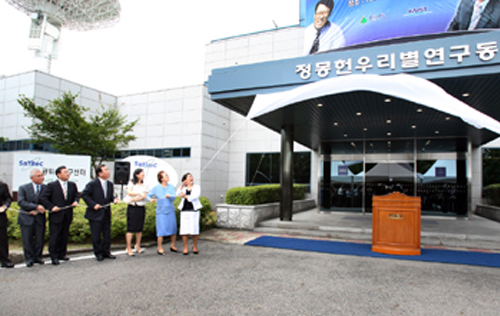 Satellite Research Lab Named After Late Hyundai Chairman Chung
KAIST, Aug. 11, 2008 -- KAIST held a naming ceremony for a research lab which was named after the late Hyundai Asan Chairman Mong-Hun Chung on Monday (Aug. 11) at the KAIST Satellite Technology Research Center.
During the ceremony, a seminar room was also named after Dr. Soon-dal Choi, President of Daeduk College, for his distinguished contributions to the development of Korean space science.
Back in 1992, the late chairman Chung donated 3.4 billion won (US$3.4 million) to KAIST to build a satellite laboratory for the development of core space technologies and the nurturing of skilled manpower.
The naming ceremony was held in commemoration of the 16th anniversary of the launch of Korea"s first small satellite "Uribyeol 1" on Aug. 11, 1992. Chung died in 2003.
Dr. Soon-Dal Choi who laid the ground work for Korea"s space development program, served as the inaugural director general of the KAIST Satellite Technology Research Center, the birthplace of Korea"s artificial satellite.
On hand at the naming ceremony were a slew of dignitaries including Jeong-Eun Hyun, Hyundai Group Chairwoman and wife of the late Chung; and about 10 chief executives of Hyundai Group companies; Seong-Hyo Park, Mayor of the Daejeon Metropolitan City; Ms. So-Yeon Lee, Korea"s first astronaut; and KAIST President Nam-Pyo Suh.
President Suh noted that late Chairman Chung made great contributions to Korea"s artificial satellite development with his donation to the satellite laboratory. He said Dr. Choi is the father of the nation"s satellite program who provided the vision of space development in Korea at a time when Korea lagged behind in the artificial satellite technology.
2008.08.12 View 17152
Satellite Research Lab Named After Late Hyundai Chairman Chung
KAIST, Aug. 11, 2008 -- KAIST held a naming ceremony for a research lab which was named after the late Hyundai Asan Chairman Mong-Hun Chung on Monday (Aug. 11) at the KAIST Satellite Technology Research Center.
During the ceremony, a seminar room was also named after Dr. Soon-dal Choi, President of Daeduk College, for his distinguished contributions to the development of Korean space science.
Back in 1992, the late chairman Chung donated 3.4 billion won (US$3.4 million) to KAIST to build a satellite laboratory for the development of core space technologies and the nurturing of skilled manpower.
The naming ceremony was held in commemoration of the 16th anniversary of the launch of Korea"s first small satellite "Uribyeol 1" on Aug. 11, 1992. Chung died in 2003.
Dr. Soon-Dal Choi who laid the ground work for Korea"s space development program, served as the inaugural director general of the KAIST Satellite Technology Research Center, the birthplace of Korea"s artificial satellite.
On hand at the naming ceremony were a slew of dignitaries including Jeong-Eun Hyun, Hyundai Group Chairwoman and wife of the late Chung; and about 10 chief executives of Hyundai Group companies; Seong-Hyo Park, Mayor of the Daejeon Metropolitan City; Ms. So-Yeon Lee, Korea"s first astronaut; and KAIST President Nam-Pyo Suh.
President Suh noted that late Chairman Chung made great contributions to Korea"s artificial satellite development with his donation to the satellite laboratory. He said Dr. Choi is the father of the nation"s satellite program who provided the vision of space development in Korea at a time when Korea lagged behind in the artificial satellite technology.
2008.08.12 View 17152 -
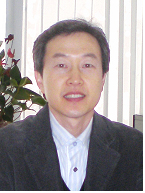 Super-Fast Internet Data Chip Developed
A KAIST research team led by Prof. Kyoung-Hoon Yang of the Electrical Engineering & Computer Science Department developed a super-fast chip that could lead to huge advancements in broadband Internet technology, the Korean Ministry of Education, Science and Technology said on Thursday (June 26).
The multiplexer chip is the first of its kind to be developed using the quantum effect of resonant tunnelling diode, according to the Ministry.
The integrated circuit chip built at the university laboratory has an operating speed of 45 gigabits per second (Gb/s), while using roughly 75 percent less energy than the previous version. The speed enables the transfer of about 4 full-length movies in one second.
The best operational broadband Internet services provide users with data transfer speed of 40 Gb/s, while most other high-speed online connections offer 10 Gb/s.
"Besides speed, the greatest achievement is low energy use," Prof. Yang said. He stressed that energy use in chips is a crucial factor because power creates heat that can melt circuits and make them inoperable.
"By cutting down on energy use, the new chips can be made smaller and with faster data transfer speed," the scientist said.
He added that efforts are underway to increase operational speed to 100 Gb/s, with energy consumption to be cut to 10 percent of current chips like the high electron mobility transistor, the heterojunction bipolar transistor and the complementary metal oxide semiconductor.
The researcher speculated that such revolutionary chips could be developed in 1-2 years and become the new benchmark in this field since existing chips have limited development capabilities.
The project has received funding from the Education-Science-Technology Ministry since 2000. The Ministry"s financial support will last until 2010.
2008.06.26 View 14177
Super-Fast Internet Data Chip Developed
A KAIST research team led by Prof. Kyoung-Hoon Yang of the Electrical Engineering & Computer Science Department developed a super-fast chip that could lead to huge advancements in broadband Internet technology, the Korean Ministry of Education, Science and Technology said on Thursday (June 26).
The multiplexer chip is the first of its kind to be developed using the quantum effect of resonant tunnelling diode, according to the Ministry.
The integrated circuit chip built at the university laboratory has an operating speed of 45 gigabits per second (Gb/s), while using roughly 75 percent less energy than the previous version. The speed enables the transfer of about 4 full-length movies in one second.
The best operational broadband Internet services provide users with data transfer speed of 40 Gb/s, while most other high-speed online connections offer 10 Gb/s.
"Besides speed, the greatest achievement is low energy use," Prof. Yang said. He stressed that energy use in chips is a crucial factor because power creates heat that can melt circuits and make them inoperable.
"By cutting down on energy use, the new chips can be made smaller and with faster data transfer speed," the scientist said.
He added that efforts are underway to increase operational speed to 100 Gb/s, with energy consumption to be cut to 10 percent of current chips like the high electron mobility transistor, the heterojunction bipolar transistor and the complementary metal oxide semiconductor.
The researcher speculated that such revolutionary chips could be developed in 1-2 years and become the new benchmark in this field since existing chips have limited development capabilities.
The project has received funding from the Education-Science-Technology Ministry since 2000. The Ministry"s financial support will last until 2010.
2008.06.26 View 14177 -
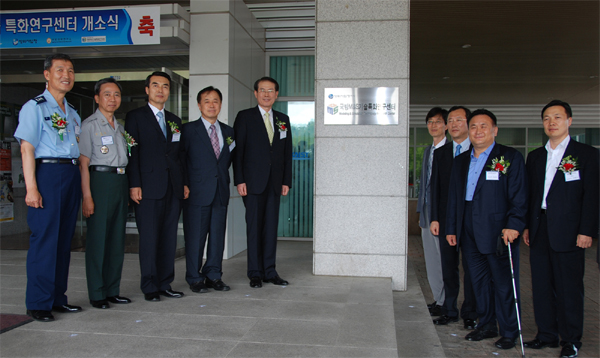 KAIST Opens M&S Technology Research Center
KAIST held an opening ceremony for a new defense research center focusing on modelling & simulation located at its main campus in Daejeon on Thursday (June 19).
The opening of the M&S Technology Research Center is aimed at developing technologies and processes to test, practice and operate newly-developed precision and micro weapons systems in virtual space. The center will be supported by two state-run defense agencies, the Defense Acquisition Program Administration and the Korean Agency for Defense Development.
The new research center is expected to receive a total of 11.5 billion won (US$11.2 million) research grants from the state for the next eight years until 2016. The center will be involved in the development of sophisticated, complex and inter-related weapons system and training research personnel in the specialized area.
The research center will undertake a total of 21 specific projects in collaboration with seven other universities in Korea. Also joining the projects are such overseas institutions as Georgia Institute of Technology and the U.S. Naval Post-Graduate School, and private defense solution providers including Posdata, Samsung Thales and LIG Nex 1.
The opening of the research center comes at a time when modelling and simulation gain growing importance as today"s armies employ more sophisticated, complex and inter-related. weapons systems and equipment than ever before.
Tae-Uk Lee, director of the research center said: "The opening of the center will spur development of operational technologies of precision and micro weapons system on our own, departing from dependence on advanced countries."
2008.06.19 View 18065
KAIST Opens M&S Technology Research Center
KAIST held an opening ceremony for a new defense research center focusing on modelling & simulation located at its main campus in Daejeon on Thursday (June 19).
The opening of the M&S Technology Research Center is aimed at developing technologies and processes to test, practice and operate newly-developed precision and micro weapons systems in virtual space. The center will be supported by two state-run defense agencies, the Defense Acquisition Program Administration and the Korean Agency for Defense Development.
The new research center is expected to receive a total of 11.5 billion won (US$11.2 million) research grants from the state for the next eight years until 2016. The center will be involved in the development of sophisticated, complex and inter-related weapons system and training research personnel in the specialized area.
The research center will undertake a total of 21 specific projects in collaboration with seven other universities in Korea. Also joining the projects are such overseas institutions as Georgia Institute of Technology and the U.S. Naval Post-Graduate School, and private defense solution providers including Posdata, Samsung Thales and LIG Nex 1.
The opening of the research center comes at a time when modelling and simulation gain growing importance as today"s armies employ more sophisticated, complex and inter-related. weapons systems and equipment than ever before.
Tae-Uk Lee, director of the research center said: "The opening of the center will spur development of operational technologies of precision and micro weapons system on our own, departing from dependence on advanced countries."
2008.06.19 View 18065 -
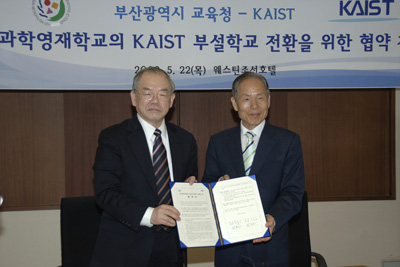 Korea Science Academy to Be Affiliated with KAIST
The Korea Science Academy, a state-run science high school located in the southeastern port city of Busan, will be converted to an affiliated school of KAIST as of March 1, 2009, university authorities said on Thursday (May 22).
The memorandum of understanding for the switchover was signed by KAIST President Nam-Pyo Suh, Dong-Geun Seol, superintendent of the Busan Metropolitan City and Jang-Hyuk Kwon, principal of the Korea Science Academy, at Seoul"s Westin Chosun Hotel Thursday morning.
When the switchover comes into effect, the principal of the high school will be appointed by the president of KAIST. Administrative details will be decided by a working-level committee consisting of delegates from the KAIST, the Office of Education of the Busan Metropolitan City and the Korea Science Academy.
The Korea Science Academy was established in 1991 to provide strengthened science courses for gifted students to prepare them for careers in science and technology. The school currently has an enrollment of 428 students and 45 classroom teachers.
2008.05.22 View 14281
Korea Science Academy to Be Affiliated with KAIST
The Korea Science Academy, a state-run science high school located in the southeastern port city of Busan, will be converted to an affiliated school of KAIST as of March 1, 2009, university authorities said on Thursday (May 22).
The memorandum of understanding for the switchover was signed by KAIST President Nam-Pyo Suh, Dong-Geun Seol, superintendent of the Busan Metropolitan City and Jang-Hyuk Kwon, principal of the Korea Science Academy, at Seoul"s Westin Chosun Hotel Thursday morning.
When the switchover comes into effect, the principal of the high school will be appointed by the president of KAIST. Administrative details will be decided by a working-level committee consisting of delegates from the KAIST, the Office of Education of the Busan Metropolitan City and the Korea Science Academy.
The Korea Science Academy was established in 1991 to provide strengthened science courses for gifted students to prepare them for careers in science and technology. The school currently has an enrollment of 428 students and 45 classroom teachers.
2008.05.22 View 14281 -
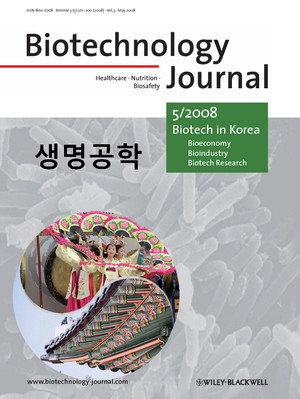 International Science Journal Spotlights Korean Biotechnology
Biotechnology Journal published by German-based Wiley-VCH, one of the world"s major scientific and technical publishers, devoted its entire special edition for May to biotechnology in Korea.
The monthly journal"s special issue was planned by KAIST Professor Sang-Yup Lee of the Chemical and Biomolecular Engineering Department who is one of the journal"s two editors-in-chief.
The special issue outlines the current status and future prospect of biotechnology in Korea, and presents five review papers and eight original papers by leading Korean biotech researchers to showcase recent developments in Korean biotechnology. Among these papers, a review by Dr. Byung-Hwan Hyeon and his colleagues describes in detail the Korean biotechnology strategies represented by "Bio-Vision 2016," and another by Dr. Ji-Hyun Kim and his collaborators presents recent progress in microbial genome projects in Korea.
In the editorial of the journal, Prof. Lee said, "Heavy industry and IT industry have been the two drivers of Korean economic growth. Korea is now considering biotechnology as its next generation growth engine."
Underscoring the growing importance of fusion research, he mentioned that integration of biotechnology with information technology and nanotechnology is advancing rapidly in Korea. Another special edition of Biotechnology Journal focusing on these exciting biotech developments in Korea is planned for the future.
2008.05.20 View 15514
International Science Journal Spotlights Korean Biotechnology
Biotechnology Journal published by German-based Wiley-VCH, one of the world"s major scientific and technical publishers, devoted its entire special edition for May to biotechnology in Korea.
The monthly journal"s special issue was planned by KAIST Professor Sang-Yup Lee of the Chemical and Biomolecular Engineering Department who is one of the journal"s two editors-in-chief.
The special issue outlines the current status and future prospect of biotechnology in Korea, and presents five review papers and eight original papers by leading Korean biotech researchers to showcase recent developments in Korean biotechnology. Among these papers, a review by Dr. Byung-Hwan Hyeon and his colleagues describes in detail the Korean biotechnology strategies represented by "Bio-Vision 2016," and another by Dr. Ji-Hyun Kim and his collaborators presents recent progress in microbial genome projects in Korea.
In the editorial of the journal, Prof. Lee said, "Heavy industry and IT industry have been the two drivers of Korean economic growth. Korea is now considering biotechnology as its next generation growth engine."
Underscoring the growing importance of fusion research, he mentioned that integration of biotechnology with information technology and nanotechnology is advancing rapidly in Korea. Another special edition of Biotechnology Journal focusing on these exciting biotech developments in Korea is planned for the future.
2008.05.20 View 15514